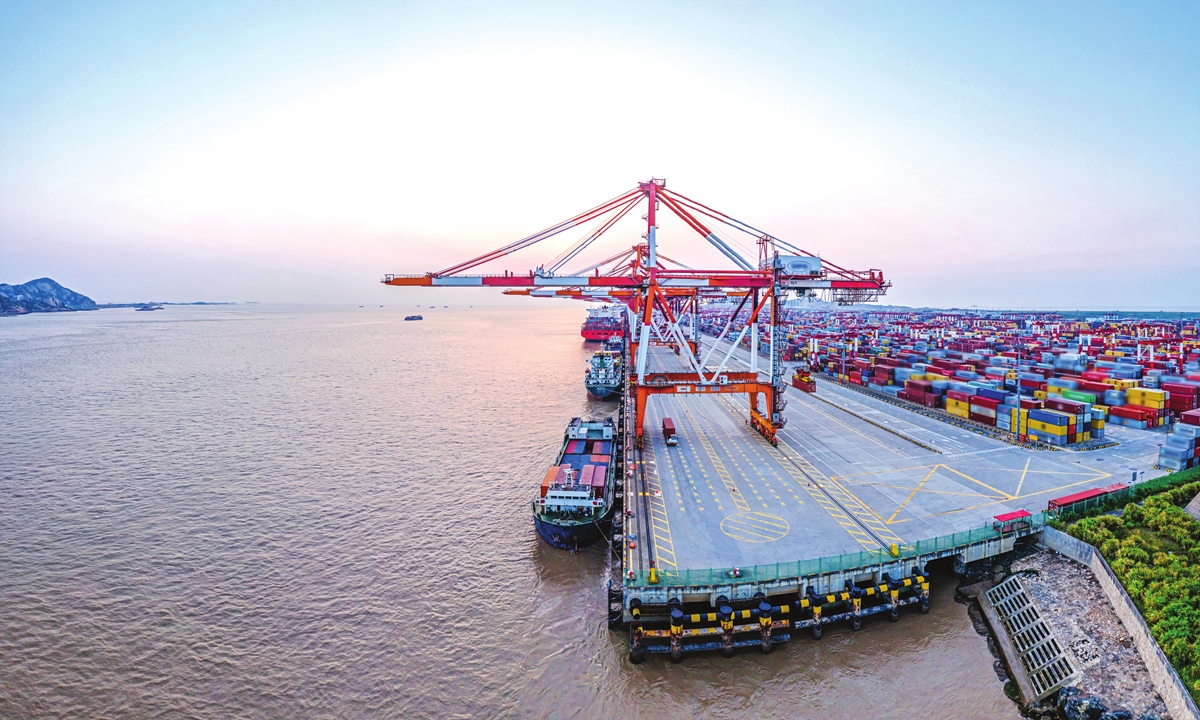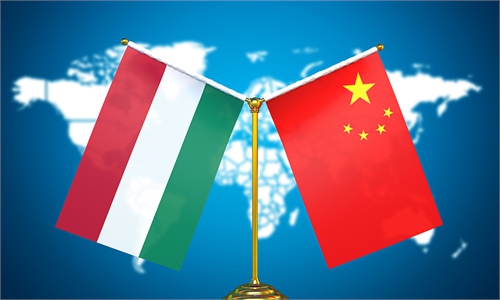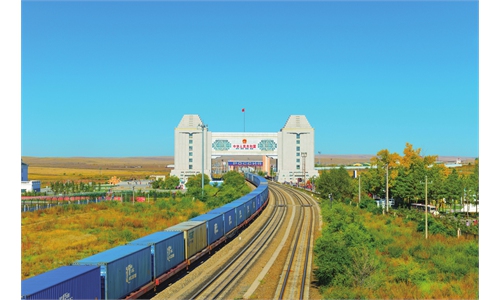Weakening euro adds costs on Chinese goods in Europe; impact offset by falling freight price, dollar settlement

A view of a port in Shanghai Photo: VCG
Qiu, the representative of a sanitary goods company in East China's Wenzhou, found that his customers in Europe are no longer buying as much volume as they did in the past after the euro weakened largely against the US dollar and the Chinese yuan. Some customers have cancelled orders, while one Spanish customer had informed Qiu in advance that their order demands will decrease by about 20 percent this year.This is bothering Qiu. "My biggest wish right now is orders. Some companies are even willing to take orders even if that means losing money," he said.
Qiu is one of the numerous Chinese exporters feeling the sting of a weakening euro, as a large part of commodities traded between China and the EU, China's second largest trading partner, is settled in euro. The appreciation of the yuan against euro will make Chinese goods more "expensive" for European customers, thus making European importers less willing to import Chinese goods.
However, experts stressed that such a situation is offset by many factors that are beneficial to Chinese exporters, such as the dropping freight cost and rising inflation in Europe, which makes them more sensitive in searching for cost effective products like those provided by Chinese factories. Thus, the negative influence exerted by the depreciating euro on Chinese exports is still limited.
Bigger pressure
Against the backdrop of Ukraine-Russia conflicts and the US Federal Reserve interest rate hikes, the euro has showed a depreciating trend in recent months against the US dollar. On July 13 it even briefly dipped below parity with the US dollar, a one-to-one exchange rate and a sight unseen since December 2002, a New York Times report noted.
The euro's exchange rate against the yuan also showed a similar trend of depreciation. As of press time the euro stood at 6.9167 against the yuan, compared with 8.17 at the end of August in 2020.
The weakening euro against the yuan is making Chinese products less competitively priced in local markets, thus adding some pressure on Chinese exports to EU markets. Li Ping, a lamp exporter based in Yiwu, the Chinese city dubbed the world small commodity capital, told the Global Times that orders from European customers decreased this year, and one important reason is that the euro has depreciated largely, making importers incapable of bearing cost hikes.
"Many European customers ask to reduce prices after making orders, with the reason that the euro's depreciation places a lot of pressure on them," Li said, adding that they don't have much price negotiation rights as small-sized exporters, and they have to give up the orders if profits are too thin.
"The money we are making can't even beat risks in transportation and exchange rate fluctuations," she said.
On the other hand, European importers of Chinese products are also experiencing headaches over the weakening euro, as it would make Chinese goods more expensive to customers and make them less willing to buy products they don't need urgently.
Long Dan, who runs a home electric appliances shopping mall in Germany's Hamburg, told the Global Times that a China-made television that used to cost about 300 euros ($307.5) now costs about 350 euros because of the exchange rate fluctuation.
According to Long, euro depreciation is definitely not good news for sellers like them. Particularly, when product prices are hiking in Germany, consumers often delay or even cancel plans to buy electric appliances.
Offset factors
However, there are also a number of factors that help to offset the negative impact of euro fluctuation on Chinese exports, both experts and businesspeople said, which make China-EU exports still on a robust track in recent months.
One such factor is the decreasing transportation price, which helps reduce the cost of China-EU trade. For example, Long noted that price of a 40-foot container shipped from Shanghai to Hamburg has decreased to about 7,000 euros currently compared with more than 10,000 euros at the second half of last year. Because of reducing freight cost, some European importers have kept prices unchanged for some China-made commodities.
Chen Jia, a research fellow at the International Monetary Institute of the Renmin University of China, told the Global Times on Wednesday that theoretically speaking, the depreciation of the euro against the yuan would create a negative impact for Chinese exports to Europe, but in reality, the influence is limited because for one, China-EU trade is not only settled in euro, but also in other currencies like the US dollar and the yuan as well, which will offset the impact of euro depreciation.
For another thing, China's supply chains have proved that it's hard to find substitutes for Chinese goods in the short term around the globe, and therefore EU's demands for Chinese goods don't entirely depend upon price, especially exchange rate fluctuation. Besides, the intention and movements between China and EU to carry out all-around cooperation are increasing recently, Chen said.
"Judging from historical experience, the foundation of China-EU trade is very solid. The two sides have relatively strong complementarities, while the distribution of upper stream and downstream industrial chains is relatively reasonable. Short-term intensification of euro fluctuation will not create too much negative impact on China-Europe bilateral trade," Chen said.
Bai Ming, deputy director of the international market research institute at the Chinese Academy of International Trade and Economic Cooperation, also told the Global Times on Wednesday that although euro's depreciation would theoretically boost EU's exports to China, the impact is largely restricted by the fact that EU's supply chains and production capacities are taking a blow from the COVID19 outbreak and other crises.
China's exports to EU rose 19.1 percent to $277 billion in the first six months this year, Chinese customs data showed. Imports fell 7.6 by percent.
US influence
Experts also noted that behind the euro's depreciation trend there lie many other economic problems currently faced by the economic bloc, including rising inflation, energy crisis and so forth, a situation in which the US has played a big part in exacerbating.
For example, Chen noted that EU has already been reliant upon Russia's cheap energy to drive economy. Therefore, the US' urge for Europe to implement sanctions against Russia has led Europe to "shoot itself in the foot."
"EU's energy products inflation level has surged to an unprecedented level after slashing imports from Russia. Although such inflation has showed signs ahead of the Ukraine crisis, undoubtedly the problem's acceleration is caused by energy sanction toward Russia," he said.
On the other hand, European central banks' monetary policies are also being suppressed by Fed's interest hikes, Chen said.
He said that even after the EU was established, Europe's political decisions can't shake off influence from the US, which makes the region harder to gain independence in global strategy.
"It has been realized by many that the source of Europe's political and economic structural problems is the US. But it tests the wisdom of European politicians on how to march the first step toward removing undue US influence," he said.



